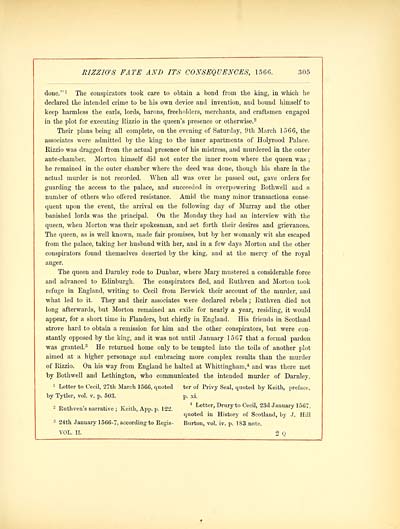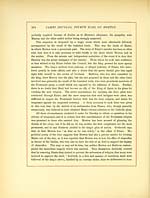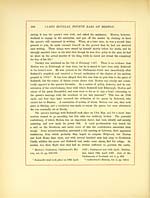Douglas book > Angus memoirs
(329) Page 305
Download files
Complete book:
Individual page:
Thumbnail gallery: Grid view | List view

RIZZIO" S FATE AND ITS CONSEQUENCES, 1566. 305
doiie." 1 The conspirators took care to obtain a bond from the king, in which he
declared the intended crime to be his own device and invention, and bound himself to
keep harmless the earls, lords, barons, freeholders, merchants, and craftsmen engaged
in the plot for executing Rizzio in the queen's presence or otherwise. 2
Their plans being all complete, on the evening of Saturday, 9th March 1566, the
associates were admitted by the king to the inner apartments of Holyrood Palace.
Rizzio was dragged from the actual presence of his mistress, and murdered in the outer
ante-chamber. Morton himself did not enter the inner room where the queen was ;
he remained in the outer chamber where the deed was done, though his share in the
actual murder is not recorded. When all was over he passed out, gave orders for
guarding the access to the palace, and succeeded in overpowering Bothwell and a
number of others who offered resistance. Amid the many minor transactions conse-
quent upon the event, the arrival on the following day of Murray and the other
banished lords was the principal. On the Monday they had an interview with the
queen, when Morton was their spokesman, and set forth their desires and grievances.
The queen, as is well known, made fair promises, but by her womanly wit she escaped
from the palace, taking her husband with her, and in a few days Morton and the other
conspirators found themselves deserted by the king, and at the mercy of the royal
anger.
The queen and Darnley rode to Dunbar, where Mary mustered a considerable force
and advanced to Edinburgh. The conspirators fled, and Ruthven and Morton took
refuge in England, writing to Cecil from Berwick their account of the murder, and
what led to it. They and their associates were declared rebels ; Ruthven died not
long afterwards, but Mortou remained an exile for nearly a year, residing, it would
appear, for a short time in Flanders, but chiefly in England. His friends in Scotland
strove hard to obtain a remission for him and the other conspirators, but were con-
stantly opposed by the king, and it was not until January 1567 that a formal pardon
was granted. 3 He returned home only to be tempted into the toils of another plot
aimed at a higher personage and embracing more complex results than the murder
of Rizzio. On his way from England he halted at Whittingham, 4 and was there met
by Bothwell and Lethington, who communicated the intended murder of Darnley.
1 Letter to Cecil, 27th March 1566, quoted ter of Privy Seal, quoted by Keith, preface,
by Tytler, vol. v. p. 503. p. xi.
* Ruthven's narrative ; Keith, App. p. 122. * Letter > ^^ to CecU ' 23d Januar y 1567 '
quoted in History of Scotland, by J. Hill
3 24th January 1566-7, according to Regis- Burton, vol. iv. p. 1S3 note.
VOL. II. o
Q
doiie." 1 The conspirators took care to obtain a bond from the king, in which he
declared the intended crime to be his own device and invention, and bound himself to
keep harmless the earls, lords, barons, freeholders, merchants, and craftsmen engaged
in the plot for executing Rizzio in the queen's presence or otherwise. 2
Their plans being all complete, on the evening of Saturday, 9th March 1566, the
associates were admitted by the king to the inner apartments of Holyrood Palace.
Rizzio was dragged from the actual presence of his mistress, and murdered in the outer
ante-chamber. Morton himself did not enter the inner room where the queen was ;
he remained in the outer chamber where the deed was done, though his share in the
actual murder is not recorded. When all was over he passed out, gave orders for
guarding the access to the palace, and succeeded in overpowering Bothwell and a
number of others who offered resistance. Amid the many minor transactions conse-
quent upon the event, the arrival on the following day of Murray and the other
banished lords was the principal. On the Monday they had an interview with the
queen, when Morton was their spokesman, and set forth their desires and grievances.
The queen, as is well known, made fair promises, but by her womanly wit she escaped
from the palace, taking her husband with her, and in a few days Morton and the other
conspirators found themselves deserted by the king, and at the mercy of the royal
anger.
The queen and Darnley rode to Dunbar, where Mary mustered a considerable force
and advanced to Edinburgh. The conspirators fled, and Ruthven and Morton took
refuge in England, writing to Cecil from Berwick their account of the murder, and
what led to it. They and their associates were declared rebels ; Ruthven died not
long afterwards, but Mortou remained an exile for nearly a year, residing, it would
appear, for a short time in Flanders, but chiefly in England. His friends in Scotland
strove hard to obtain a remission for him and the other conspirators, but were con-
stantly opposed by the king, and it was not until January 1567 that a formal pardon
was granted. 3 He returned home only to be tempted into the toils of another plot
aimed at a higher personage and embracing more complex results than the murder
of Rizzio. On his way from England he halted at Whittingham, 4 and was there met
by Bothwell and Lethington, who communicated the intended murder of Darnley.
1 Letter to Cecil, 27th March 1566, quoted ter of Privy Seal, quoted by Keith, preface,
by Tytler, vol. v. p. 503. p. xi.
* Ruthven's narrative ; Keith, App. p. 122. * Letter > ^^ to CecU ' 23d Januar y 1567 '
quoted in History of Scotland, by J. Hill
3 24th January 1566-7, according to Regis- Burton, vol. iv. p. 1S3 note.
VOL. II. o
Q
Set display mode to:
![]() Universal Viewer |
Universal Viewer | ![]() Mirador |
Large image | Transcription
Mirador |
Large image | Transcription
Images and transcriptions on this page, including medium image downloads, may be used under the Creative Commons Attribution 4.0 International Licence unless otherwise stated. ![]()
| Histories of Scottish families > Douglas book > Angus memoirs > (329) Page 305 |
|---|
| Permanent URL | https://digital.nls.uk/96535742 |
|---|
| Attribution and copyright: |
|
|---|---|
| Description | A selection of almost 400 printed items relating to the history of Scottish families, mostly dating from the 19th and early 20th centuries. Includes memoirs, genealogies and clan histories, with a few produced by emigrant families. The earliest family history goes back to AD 916. |
|---|

